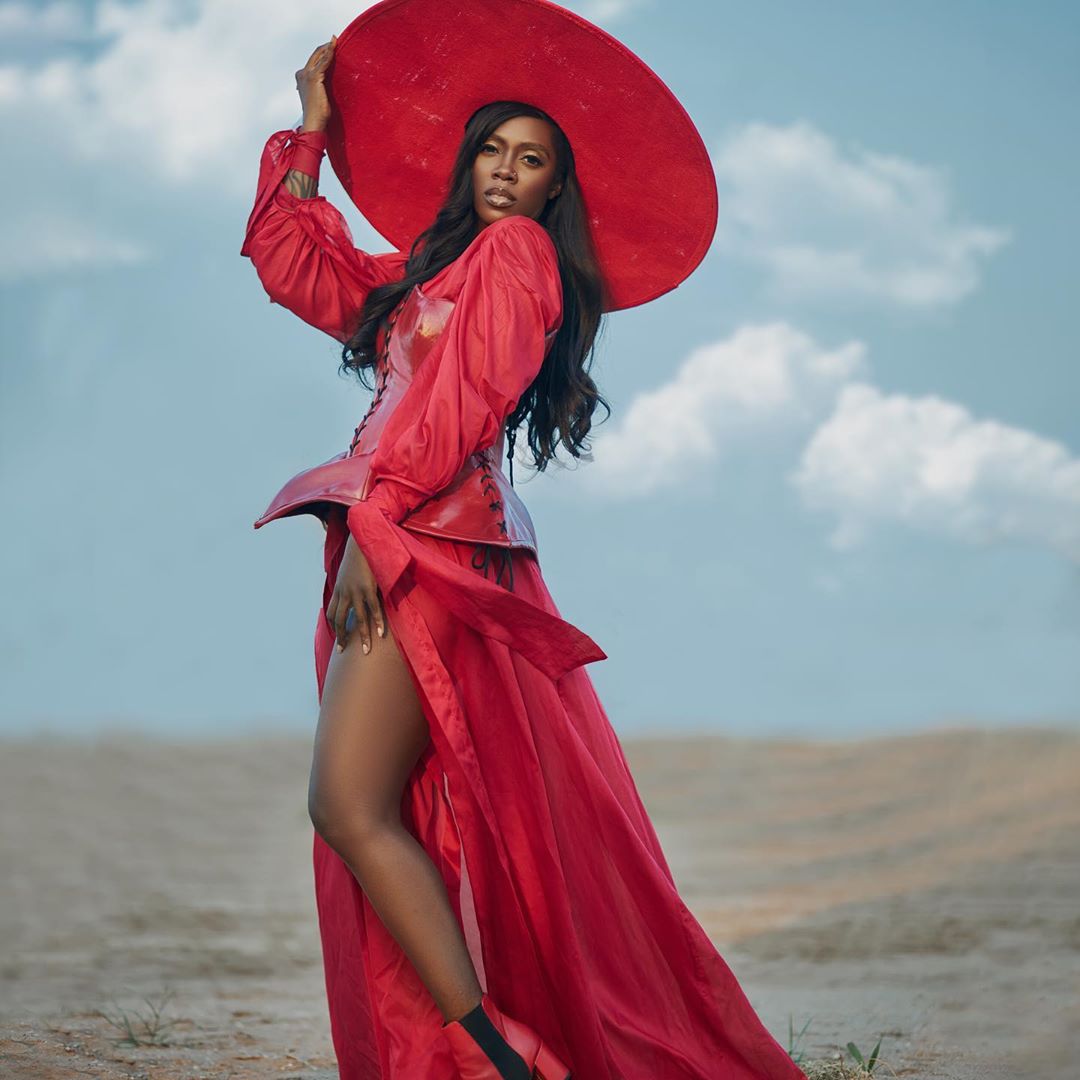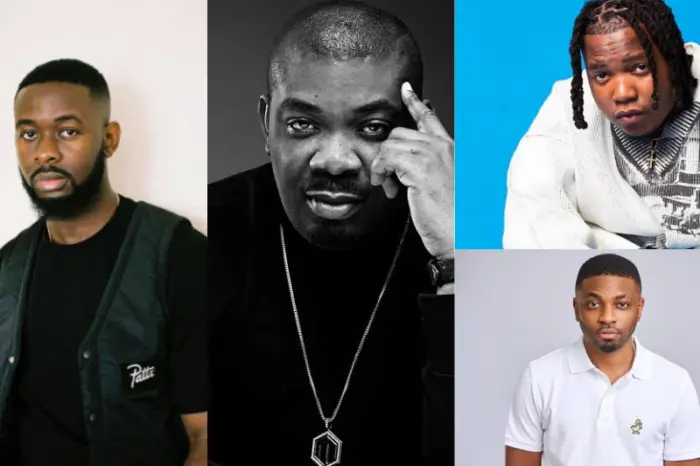Behind every big Afrobeat hit, there is a producer behind it and most of the times, you might find the Afrobeat producers listed here at the helm.
Afrobeat has a robust origin. To be precise, the genre is arguably one of the most prevalent types of music to come out of West Africa- Nigeria. The genre has gone through many stages and phases. Fela, who is the pioneer of the genre, used it to raise conversations relating to the political scene in the country; alongside his band [Africa 70]. They held live performances buttressed with a call-and-response musical arrangement.
In the 80s, Hip Hop music was introduced to the country’s landscape. However, while Hip Hop has its origin in the west, the new wave artists during that period incorporated some elements of hip hop in their style of music alongside some components of Afrobeats. Musicians like The Remedies, Tony Tetuila, and Plantashun Boiz were the first set of trailblazers to sample elements of the genre, as mentioned above.
Next came a new lineup of artists who made music out of the genre. Names like Tuface Idibia, Vector, M.I. Abaga, Ruddgedman, Eedris Abdulkareem, Naeto C, P-square, and Ice-Prince led the Hip Hop tag. And at the start of the 2000s decade, pop music artists arose. It was in the 2010s that a new subgenre from Afrobeat got coined. The pop music of the period was gradually studied and branded a new name- Afropop, spearheaded by personalities like Wizkid, Olamide, Davido, Tiwa Savage, and Burna Boy. Recently newcomers like Ckay, Fireboy D.M.L., Rema, Omah Lay, and more are the new vanguard of Afropop music.

The 2010s, brought a different array of producers. Before that time, and even throughout the early period of the late noughties, producers were mostly almost unobtrusive and unproperly credited. To create a more discernible presence, several producers came up with audio tags to gain some requisite recognition for themselves.
The idea of audio tags is also highly influenced by how digitalized music consumption has gotten. When physical C.Ds and cassette tapes were in vogue, the production credits of a song or album could be seen inscribed on them. But it ended there. While the production credit could be found on the physical C.D.s, it did little or nothing at all in helping to make producers more visible in the music-making process. But with, the use of the audio tag, it gave record producers a new sense of identity.
Lately, producers are finally getting their flowers. We look at some of the prime Afrobeat producers over the last decade and how they’ve contributed to the ever-growing Afrobeat genre.
RELATED ARTICLES:
– Reactions as Afrobeats legend Fela Kuti falls short of Rock Hall of fame list
– “I am the reason why afrobeats is international today” – Samklef
– Impact of IrokoTV on the Nollywood and African Movie Industry.
7. Young Jonn and Pheelz
In 2011, following the demise of Da Grin, who is credited as the pioneer of dialect rap. Olamide came into the music scene with similar artistry to Da Grin. His first-ever single, “Eni Duro”, was sung mainly in the Yoruba Dialect. The release of his debut album Rapsodi introduced his budding fans to the name of Young Jonn and Pheelz, who have since both worked close-knit with the singer to create some of his biggest local hits.
Until 2020, when Olamide released his seventh studio project, the pair of Young Jonn and Pheelz helped Olamide curate some of the biggest songs in his career in the last decade. Songs like “Durosoke”, “Anifowoshe”, “Melo Melo”, “Bobo”, and “Story for the Gods” are of the pair’s creation, as mentioned earlier. Away from extensively working with Olamide, Pheelz also worked with acts like Mr. Eazi, Fireboy D.M.L., and M.I. before the end of the decade.
However, the duo’s influence narrows down immensely back to Olamide. They are responsible for fashioning and helping set the template for what other producers in the new decade could work with when it comes to producing street-styled songs.
6. Legendury Beatz
The sibling duo Uzezi Oniko and Okiemute Oniko’s first interaction with a Nigerian artiste was in 2009 with Weird MC, before the pair started working amply with Wizkid in 2012. They also produced Brymo’s 2011 single “Ara,” a kind of E.D.M. track. With Wizkid, Legendury Beatz created many hit singles in his name that had the last decade in a chokehold.
The creative duo is credited largely on Wizkid’s second studio album, Ayo, which birthed the impressive afrobeat number- “Ojuelegba”. The track was one of the stepping stones for the global trajectory of Afrobeat. The soulful, melancholic song pinpointed the struggles of the superstar’s rise to fame and became one of the few Nigerian songs to land international features.
“Ojuelegba” also helped reveal Wizkid’s burgeoning fame back then to the other audience outside the African continent. While “Ojuelegba” caught the eye of the global audience, it wasn’t the only production that Legendury Beatz had produced for the artiste. Their relationship started in 2012 with the production of the infectious dancehall song “Azonto.” Away from Wizkid, the duo has flexed their production skills with artists like Ice Prince, May D, Seyi Shay, Chindinma, Skales, and L.A.X. All of whom sprung up during the last decade.
5. Sarz
Sarz started producing beats before the start of the last decade, but it was during the 2010s that he made a name for himself. Before working with Wizkid in 2012 on “Dance for me,” he produced hits songs like “Joor” remix for Jahbless, which featured 2010s hip-hop vanguard like Iceprince, Reminisce, Durella, Ruggedman, and Eldee, “Ghetto” by Shank and “Ka ko bi Chicken” by Reminisce- these songs were classics that defined what music at the start of last decade looked like.
He followed a different trajectory to work on Wizkid’s 2014 hit track “Jaiye Jaiye.” The beat that ended up being used for the song was initially reserved for his album. Soon after, his tagline “Sarz on the beat,” which later evolved to “Really”, became an august catchphrase in songs. He cemented a place for himself in Wizkid’s discography as a hitmaker producer.
Sarz became a trendsetter for producing Afro-house songs [a sub-genre of Afrobeat helmed by artists like Niniola in Nigeria]. In 2020, during the genesis hour of the ranging coronavirus pandemic, Sarz’s mastery became more core center during a face-off on Instagram Live with fellow veteran producer Shizzi as both creatives unrolled all the music production under their belt. Sarz production work has been created to stand out for its glossy, bouncy African rhythm and minimalistic production.
4. Kiddominant
Kiddominant produced Davido’s 2017 hit track “Fall”, another song that expanded afrobeat songs in the West. These feats earn the 29-year-old enigma a spot at the producers’ table behind the biggest afrobeat song of the last decade. Growing up in Lagos, Nigeria, Kiddominant’s journey to becoming a creative started at the age of 14 as a D.J. However, his trajectory to being a music producer began in 2013 after arriving from the United Kingdom, where he had to learn to make use of the fruity loop application during vacation.
When he returned to Nigeria, he met Orezi and helped produce the singer’s debut single, “Rihanna.” After that, Davido became one of his clients and before “Fall,” he produced a vast chuck of unmissable party starter tracks like “Dodo” and “The Money.” Before the last decade came to a close, Kiddominant expanded his penchant passion for producing afrobeat songs outside of the country, he’s credited to have worked with international musicians like AKA, Cassper Nyovest, Poopcan, Russ, and Chris Brown.
3. Kel P
“Its kel p vibes” is the tagline that ushers listeners into a Kel P produced track. As Afrobeat crossed over into the international market last decade, it was a culturally shifting and defining moment for the genre. The last decade introduced an array of distinguished artists, amongst them was Burna Boy whose whole 8-year career came full circle with the release of a body of work that bagged a Grammy nomination (and an eventual win). Kel P co-produced ten songs out of the 19 tracked album that got the Grammy nod. Songs like “Dangote” and “On the Low” were helmed by the beatmaker. Kel P’s journey as a producer started in the mid-period of the 2010s- in 2016, he met Sarz, who served as a mentor to the then novice, helping him create his eponymous tagline. Before 2020, he also worked with artists like Niniola, Phyno, and Dadju.
2. Don Jazzy
To fully understand how crucial Don Jazzy’s role as a music producer is, one must know how it all began. In 2004, Don Jazzy came back to Nigeria with D’banj after the former spent some years in the U.K. They formed a powerhouse on their arrival on the Nigerian scene. The record-label Mo’hits came to life, and Don Jazzy exclusively produced D’banj’s first three albums, which housed powerful era-defining songs that shaped the early 2000s.
Over time, Mo’hits Records added new signees like Dr. Sid, D’Prince, and Wande Coal, with Don Jazzy continuing to serve as the executive producer for all the songs coming from the label. When the label was dissolved in 2012 due to a difference in interest, its progenitor went ahead to curate another record label.
Mavin’s Record had a new crop of artists who had unforgettable songs in the 2010s. These were songs from Tiwa Savage, Korede Bello, and Dr. Sid. Apart from assuming the role of a record producer, Don Jazzy also served as a talent developer and has, over time, sourced out excellent and proficient ac s adding to the growing number of popstar doyen.
Don Jazzy has a list of admirable feats to his name, from producing the Mavin all-star hit song “Dorobucci” in 2014 to helping Korede Bello score his first hit with “Godwin” the following year. The hitmaker’s beats are always jumpy and fast-paced. While Jazzy is more than just an afrobeat producer, doubling now as a mogul and acclaimed figure, his contribution to Afrobeat as a record producer in the last decade cannot be subverted.
1. Shizzi
Before the audio tag “It Shizzi, m-m- magic fingers” became part of the 37-years-old record producer’s career, Davido can arguably be the first artiste to shout out this name on a song. In 2011, when Davido released his second single “Dami Duro” from his debut album Omo Baba Olowo, the singer introduced himself alongside Shizzi as the producer behind the song. Later he went on to produce five songs on the album. He’s also credited for further endeavors like “Gobe” and “Skelewu.”
The producer also dabbled into Wizkid’s career, producing the beat for “Love My Baby,” and later, “Show You The Money” in 2015. It is only if you were living under a rock in the last decade that you won’t know these songs were bangers. He also helped Davido create international hits, songs like “Tchelete,” which featured the South African duo- Mafikizolo, which was a success in Nigeria and South Africa, and “Fans Mi,” which featured Meek Mill—making use of an array of instruments like keyboard, synthesizer, drums, and sampler. Shizzi established himself as one of the most sought-after producers of the last decade.
So, there you have it – a list that any lover of Afrobeat would be proud of. Is there an Afrobeat producer from the 2010s that you believe should have made this list that is not here? Let’s know in the comment section.
You may also like to read our latest article, Best Korean Movies To Watch On Netflix.


